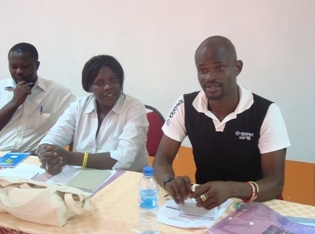Civil society activists call for free and fair elections
By Julius N. Uma
April 4, 2010 (JUBA) — Sudan’s National Elections Commission (NEC) officials should strive to ensure that the forthcoming general election is free, fair and transparent enough to meet domestic and international observers’ standards, a coalition of Civil Society Organizations (CSOs) resolved yesterday.

NESI-Network is an umbrella organization of 77 member organizations operating in all the 10 states of South Sudan, Southern Kordofan, Blue Nile and Abyei areas. The organization, which has fully been operational in Sudan since 2000, mainly deals with the thematic areas of peace-building, human rights, capacity building, advocacy and lobby as well as gender mainstreaming, among others.
However, participants attending the two-day workshop on civic and voters’ education also raised concerns on the actual conduct of the forthcoming general election, especially in relation to the observation and monitoring roles.
As such, these participants, mainly drawn from a network of civil society organization, emphasized the importance of domestic election observers earmarked to be deployed within the country, with many arguing that they play essential roles in not only reducing the level of election-related violence, but further raise confidence levels and the integrity of the entire process.
According to Mr. Michael Bimo, a Civic Education Officer from the Institute for Promotion of Civil Society (IPCS), the success of any election mainly hinges on the three basic principles of transparency, accountability and credibility, saying domestic election monitoring and observation remains critical in all these processes.
“Domestic election monitoring and observation is a deliberate initiative by an organized group of citizens to monitor and observe elections,’’ he said, adding that, “This kind of move is usually undertaken as a supplementary effort to the government to promote democracy in the country.”
The two-day workshop, based on the theme, “Towards free and fair elections,” which was organized by NESI-Network attracted organizations such as Generation Agency for Development and Transformation-Pentagon (GADET-Pentagon), Cush Community Relief International (CCRI), Assistance Mission for Africa (AMA), Yar Arol Foundation (YAF), Sudanese Women Association (SWA), Women Empowerment Group and New Sudan Women Federation (NSWF).
KEY FACTS ON SUDAN’S ELECTION
Sudan is scheduled to hold general elections, its first in 25 years to be held in both north and south, from April 11 to 18. The election is regarded as a key requirement within the country’s Comprehensive Peace Agreement (CPA).
During this historic election, however, voters will cast ballots for the President of Sudan, the National Assembly, President of the Government of Southern Sudan, Southern Sudan Legislative Assembly, and governors and assemblies for the 25 states of Sudan (Southern Kordofan state, on the north-south border, will hold only national-level elections). In the north, voters will cast eight separate ballots, and in the south, voters will cast 12 separate ballots.
Hitherto, a total of 26 political parties, including the two ruling parties, the National Congress Party (NCP) and the Sudan Peoples’ Liberation Movement (SPLM) have adopted the Sudan Electoral Code of Conduct prepared by the African Union High Level Panel on Sudan. This code commits the parties to common principles for free and fair elections.
Under the code, however, parties undertake to abide by electoral laws, promote a fair electoral contest, and to refrain from all forms of violence and obstruction of other contestants.
According to the electoral code, parties in government must also ensure that they do not use their access to official resources (including the state media) to obtain unfair electoral advantage for themselves or any other parties or to obstruct other parties. The code is designed to complement Sudan’s national electoral laws and the work of the Sudanese government-initiated NEC.
(ST)

Dinka Boy
Civil society activists call for free and fair elections
April election in all levels must be performed in the entire Sudan ,so that we can go ahead for referendum in 2011. We want Yasir Arman back to rival with Omer Bashier in April 11.
Thanks
Mr Famous Big_Logic_Boy
Civil society activists call for free and fair elections
Some of the places in South with high level of violence are Abeyi border, Bor and Rembek. The prospect of devastation are highly expected to happen at these area. Everyone knows the reason.